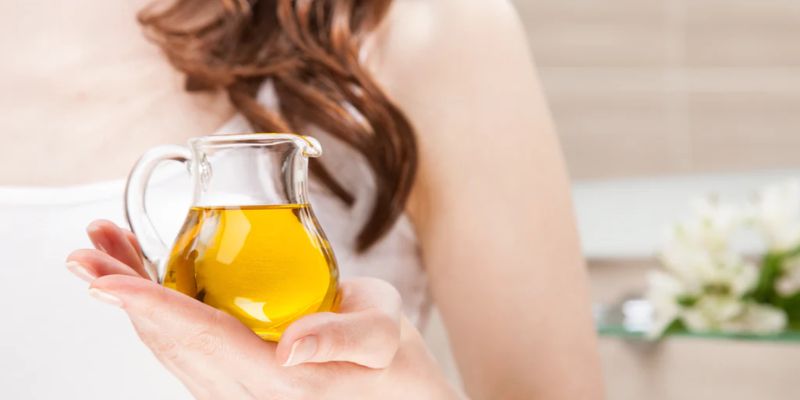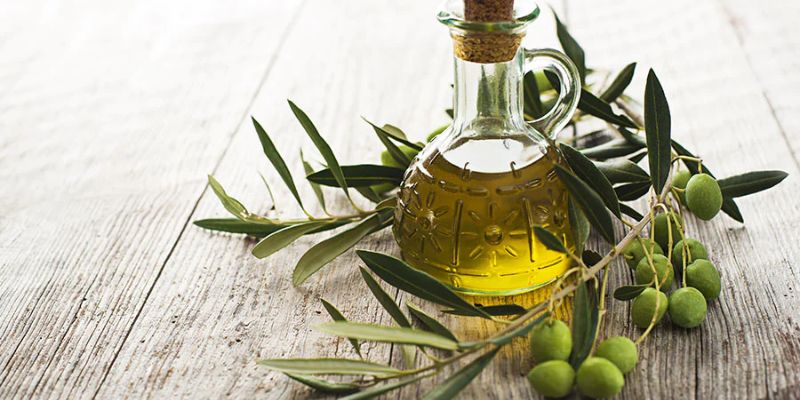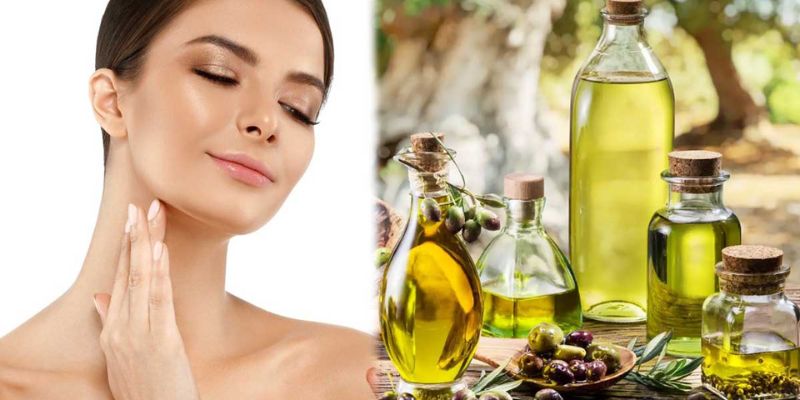
When caring for your skin, how you nourish it from the outside matters as much as your nutrition. Olive oil is a natural, nutrient-rich ingredient used for centuries to help protect and nourish skin and hair.
Today, olive oil continues to be celebrated for its array of nutrients and beneficial properties, specifically when applied topically - making it an excellent choice for those interested in natural skin care products.
In this blog post, we'll look at some key ways to incorporate olive oil into your beauty routine – including its moisturizing benefits on dry skin, reducing inflammation with anti-inflammatory compounds, healing minor blemishes & acne scars, and more!
What's in Olive Oil

When used topically, olive oil's different nutrients and components can help hydrate and shield the skin. The oil from pressed and expressed olives, which is high in beneficial monounsaturated fats and antioxidants, is used to create olive oil. Additionally, it has anti-inflammatory polyphenols and vitamins A and E.
The most notable components are fatty acids, such as oleic acid, linoleic acid, and palmitic acid; vitamins A, E, and K; squalene; phytosterols; polyphenols; and minerals.
The fatty acids in olive oil have been found to help maintain the integrity of cell membranes and promote healthy hydration levels on the skin. Oleic acid also helps to lock in moisture by forming a protective barrier on the surface.
Vitamin E works as an antioxidant to neutralize free radicals while also helping to improve skin healing processes. Vitamin K helps to reduce inflammation and puffiness in the skin, while polyphenols may have antioxidant properties that can help protect against sun damage.
When used for skin care, olive oil is typically applied topically as an oil or added to lotions and creams as one of the main ingredients. Olive oil benefits various skin types, from dry and sensitive to oily and acne-prone.
Whether you use it on its own or add it to your favorite products, incorporating olive oil into your daily routine can help hydrate your skin with vital nutrients while protecting it from environmental damage.
Olive Oil's Benefits for Skin

Moisturizes the skin
From head to toe, olive oil can be applied as a moisturizer for the skin. It is rich in antioxidants and fatty acids that nourish the skin. The vitamin E found in olive oil helps protect the skin from free radicals while providing hydration and suppleness. Additionally, its anti-inflammatory properties make it an ideal ingredient for soothing irritated or inflamed skin.
When used as a facial moisturizer, olive oil helps reduce wrinkles by increasing collagen production and decreasing water loss through the outer layers of your skin.
It's lightweight yet deeply hydrating as an all-purpose body moisturizer – perfect for treating dry patches on elbows, knees, hands, and feet. To experience these benefits firsthand, massage a few drops of olive oil directly onto your skin. You'll be amazed at the soft and smooth feeling it leaves behind!
When used correctly, olive oil can work wonders on your skin – making it look and feel hydrated, healthy, and beautiful. Moreover, this natural solution is affordable and accessible – meaning you no longer need to search far and wide for the best skincare products.
Reduces the signs of aging
Olive oil has been used for centuries to help reduce the signs of aging. Evidence suggests that olive oil is loaded with compounds that can delay the natural aging process of your skin, such as squalene and polyphenols.
Squalene helps to protect your skin against free radical damage and oxidative stress, while polyphenols act as antioxidants that neutralize free radicals and reduce inflammation in the skin. Additionally, olive oil is packed with vitamins E and K, essential nutrients for healthy-looking skin.
Vitamin E helps to rebuild damaged collagen fibers in the dermis layer of your skin, while vitamin K aids in reducing dark circles under the eyes, a common sign of aging. Applying a small amount of olive oil directly onto your face or using it as part of a DIY homemade face mask can help protect your skin from signs of aging.
Helps cleanse the skin
Olive oil is a natural cleansing agent for the skin. It contains several compounds, such as oleic acid and vitamin E, that help remove dirt from pores and hydrate the skin without feeling greasy or weighed down.
Using olive oil as part of your regular cleansing routine can help keep your skin free from bacteria and pollutants that accumulate throughout the day. Additionally, olive oil helps to maintain healthy pH levels on the skin's surface and restore its natural protective barrier against external environmental aggressors.
Incorporating olive oil into your skincare routine is an excellent way to nourish and cleanse your complexion without stripping away too much of its essential oils.
Promotes wound healing
Olive oil is a powerful healing agent used for centuries to help promote wound healing. It has anti-inflammatory and antimicrobial properties making it an effective treatment for cuts, abrasions, and other minor wounds.
Its antioxidant compounds can also help reduce the risk of infection while speeding up recovery. Additionally, its moisturizing properties help keep skin hydrated as it heals, aiding in regenerating healthy skin cells. Applying olive oil directly onto affected areas twice per day can have considerable benefits on wound healing.
Furthermore, adding a small amount of olive oil to your diet can benefit general health maintenance and immune system support. With its long list of advantages, it's no wonder why olive oil is such an important part of skincare routines.
Ways To Use Olive Oil For Skin
Here are some key ways to incorporate olive oil into your beauty routine:
Moisturizer
To use as a moisturizer, warm up a small amount between your fingertips before applying directly onto the face or body. It helps to give your skin a healthy, glowing appearance and can be used in combination with other ingredients or on its own.
Makeup Remover
Olive oil makes an excellent makeup remover due to its nourishing properties and ability to break down stubborn makeup products. It's gentle enough for even the most sensitive skin types yet powerful enough to remove waterproof mascara or eyeliner without irritating eyes.
To use olive oil as a makeup remover, warm up 1-2 tsp in your hands before massaging it onto the face and neck area. Wipe away any remaining residue with a soft cloth soaked in warm water.
Hair Serum
Another popular use of olive oil is as a hair serum. Rich in vitamins and minerals, it helps to nourish dry or damaged hair while promoting natural shine and strength. To use as a hair serum, warm up 1-2 tsp between your fingertips before applying it on the ends of your strands, avoiding the roots. Leave it on for 20 minutes before washing away with shampoo and conditioner.
Cuticle Oil
Olive oil also makes an effective cuticle oil that helps soothe rough or cracked cuticles caused by the overuse of nail polish removers or acetone-based cleansers. Use a small amount of olive oil on each finger before massaging into the cuticles - allowing it to penetrate deeply and help moisturize.
FAQs
Is olive oil good for wrinkles on your face?
Yes, olive oil is a great natural solution for wrinkles. It helps to reduce the signs of aging by increasing collagen production and decreasing water loss through the outer layers of your skin.
Can I use olive oil as a moisturizer?
Olive oil makes an excellent all-purpose body moisturizer - perfect for treating dry patches on elbows, knees, hands, and feet.
Does olive oil have any anti-aging benefits?
Evidence suggests that olive oil is loaded with compounds that can delay the natural aging process of your skin, such as squalene and polyphenols. Additionally, it's packed with vitamins E and K, essential nutrients for healthy-looking skin.
Conclusion
Olive oil is an excellent natural product for your skincare routine. Not only is it an affordable and accessible choice, its cleansing and moisturizing benefits are renowned. From reducing the signs of aging to speeding up wound healing, olive oil can be a powerful partner in preserving youthful and healthy skin. In addition to being used as a moisturizer or makeup remover, olive oil can be used as a cuticle oil or a hair serum.
-
Recommended Reading



